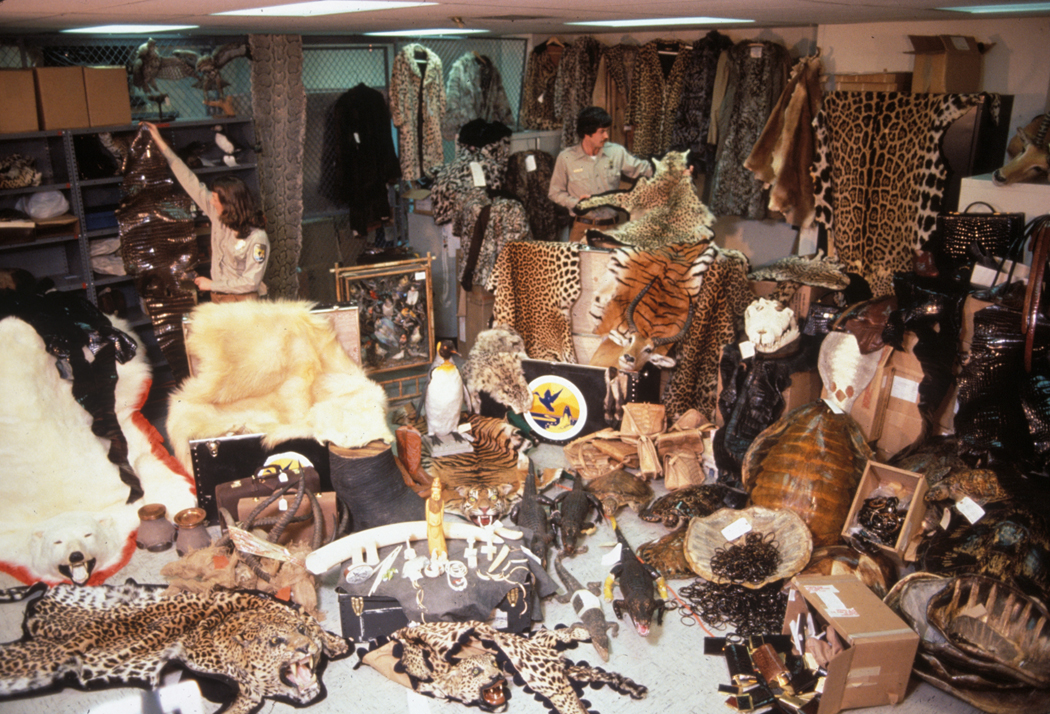 |
| This white tiger cub is one of many endangered species rescued during a joint international operation known as Operation Thunderball. |
Last month, a concerted international operation has resulted in the confiscation of large amounts of protected plants and animals across every continent. The operation, known as Operation Thunderball, was carried out by the Interpol and World Customs Organization (WCO) with customs and police administrations leading combined enforcement efforts against wildlife and timber crimes across 109 countries. The operation pinpointed trafficking routes and crime hotspots ahead of time, allowing border, police and environmental officers to confiscate protected wildlife products varying from live primates and big cats to timber, marine wildlife and derived materials such as clothing, beauty products, traditional medicines, food items, and handicrafts. A team of customs and police officers together conducted worldwide enforcement activities from an Operations Coordination Center at Interpol's Global Complex for Innovation in Singapore. The first results led to recognition of nearly 600 suspects, sparking arrests all around the world. Further arrests and prosecutions are expected as continuous worldwide investigations progress. The operation's seizures reported to date include:
- 23 live primates
- 30 big cats and large amounts of animal parts
- 440 pieces of elephant tusks and an extra 545 kilograms of ivory
- Five rhino horns
- More than 4,300 birds
- Just under 1,500 live reptiles and almost 10,000 live turtles and tortoises
- Nearly 7,700 wildlife parts from all species, including more than 30 kilograms of game meat
- 2,550 cubic meters of timber
- More than 2,600 plants
- Nearly 10,000 marine wildlife items, such as seahorses, sharks, dolphins, and corals
 |
| Confiscated wildlife products at JFK Airport |
Operation Thunderball is the latest move marking a new direction in the long-standing partnership between the Interpol and WCO, bringing them together as joint functional partners on the frontline to guarantee that wildlife trafficking is addressed extensively. Through this operation, police and customs officers, aided by environmental authorities, forestry and wildlife agencies, border agencies and CITES management authorities, worked together to pinpoint and intercept shipments containing plants and animals protected and regulated under the CITES convention. The operation is the third one in a series of "Thunder" operations in the past two years. The previous ones included Operations Thunderstorm in 2018 and Thunderbird in 2017. However, it is not the first operation of its kind this year. In April and May this year, another operation titled Operation Blizzard saw thousands of seizures on a global scale and nearly 200 suspects identified through concerted information sharing. Operation Blizzard included agencies from 22 countries and led to confiscations ranging from live animals to chic fashion products. The operation has already resulted in more than 4,400 seizures and recognition of more than 180 suspects, prompting arrests and inspections worldwide. Following six arrests in Italy and another six in Spain, more arrests and prosecutions are expected as investigations carry on. Operation Blizzard's confiscations reported to date include:
- About 4,400 live animals, including twenty alligators and crocodiles, 2,700 turtles and tortoises, as well as 1,500 lizards, geckos and snakes
- Six Kenyan sand boas discovered in air cargo in the U.S as well as two pythons in Western Australia
- Turtles, tortoises, boas, and geckos confiscated from a pet shop and private residence in Israel
- 150 products derived from reptiles, including watchstraps, wallets, handbags, medicines, and taxidermy products
- Live owls, parrots, swans, and falcons, along with elephant ivory and bushmeat products
.jpg/1920px-Myanmar_Illicit_Endangered_Wildlife_Market_04_(cropped).jpg) |
| Pangolins and reptiles on display for public consumption in Burma |
I find it extraordinarily amazing that international organizations like the Interpol, Europol, and the World Customs Organization have joined forces to battle against the ongoing threat of illegal wildlife smuggling. And there is no better representation of such a partnership between these organizations than global operations like Thunderball, Blizzard, etc. which tackle various incidences of wildlife crimes by identifying trafficking routes, hotspots and suspects, intercepting the shipments, and arresting and prosecuting the suspected perpetrators involved. It is equally fantastic to see that the operations are being supported by various environmental, wildlife, forestry, and border agencies in tackling wildlife crimes around the world. I also find it interesting that various news reports documenting seizures of protected species are a result of these operations. For example, Canada recently took part in Operation Thunderball and confiscated diet pills made from pangolins and various African plants along with dozens of black bear parts. However, I also firmly believe that environmental crime can be efficiently tackled if regular people do their part by working cooperatively with Interpol, Europol, and other international organizations. I'm not saying that people should do the same work as these organizations in confiscating wildlife products and arresting those involved. Instead, they should conduct awareness programs to educate, inspire, and enlighten one another about the importance of protecting the world's endangered wildlife from poaching and illegal wildlife smuggling. This includes never purchasing items made from such animals and refrain from participating in hunting safaris in Africa, where clients pay hefty sums of money to hunt various big game animals and pose for pictures. Ever since Botswana lifted its ban on elephant hunting, the number of elephants poached has escalated. It is highly crucial that people report to various wildlife protection organizations when hearing about news of someone posing for a photo with an elephant, lion, or any other majestic wild animal. I strongly believe that people around the world should recognize that environmental crime occurs on an international scale and is a threat to national and regional security. It results in cross-border forays with organizations involved in numerous organized criminal activities such as money laundering and terrorism funding. This is why it is highly crucial to take illegal wildlife trafficking seriously and help fight it to the end.
No comments:
Post a Comment